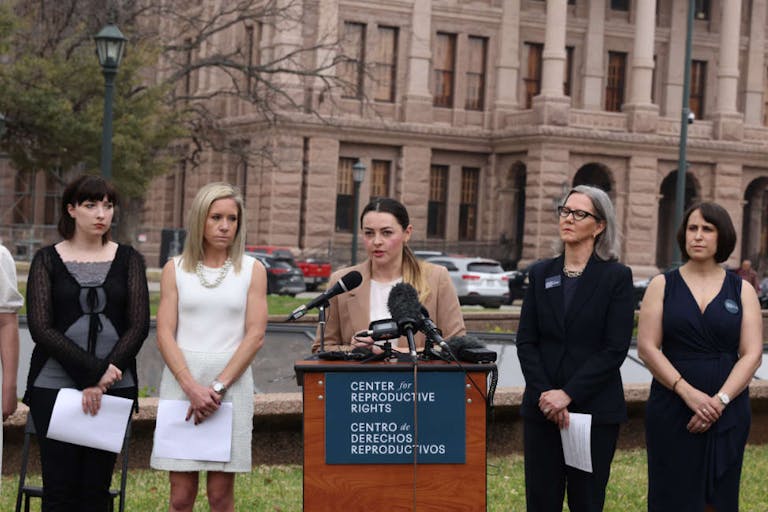🚨Today, the Supreme Court of Texas unanimously upheld the Human Life Protection Act, one of our state’s pro-life laws. I will continue to defend the laws enacted by the Legislature and uphold the values of the people of Texas by doing everything in my power to protect mothers

Texas Supreme Court upholds Human Life Protection Act after legal challenge
Texas Supreme Court upholds Human Life Protection Act after legal challenge
The Texas Supreme Court has upheld the Human Life Protection Act, which protects virtually all preborn children from abortion in the state of Texas. There are certain health/life exceptions in the law, and plaintiffs argued that those exceptions are overly vague, putting women’s lives at risk, and therefore, need to be clarified. The court, however, disagreed.
A press release from the Texas Attorney General’s office states that the court’s opinion explained:
Texas law permits a life-saving abortion. Under the Human Life Protection Act, a physician may perform an abortion if, exercising reasonable medical judgment, the physician determines that a woman has a life-threatening physical condition that places her at risk of death or serious physical impairment unless an abortion is performed.
The law permits a physician to intervene to address a woman’s life-threatening physical condition before death or serious physical impairment are imminent. Because the trial court’s injunction departed from the law as written without constitutional justification, we vacate its order.
In the opinion, written by Justice Bland, the court noted that life-saving abortions are permitted under the law.
“A physician who tells a patient, ‘Your life is threatened by a complication that has arisen during your pregnancy, and you may die, or there is a serious risk you will suffer substantial physical impairment unless an abortion is performed,’ and in the same breath states ‘but the law won’t allow me to provide an abortion in these circumstances’ is simply wrong in that legal assessment,” the court wrote.
The court also stated that the claim in the suit, filed by the pro-abortion Center for Reproductive Rights, was that the law made doctors afraid to perform life-saving procedures, believing they would be forced to defend themselves in court if they intervened. The court rejected this claim, and pointed out that the law leaves doctors able to seek guidance from existing medical opinion and “peer-reviewed best practices,” as opposed to the sheerly subjective standard the Center for Reproductive Rights seems to prefer (emphases added):
Rather, in an enforcement action under the Human Life Protection Act, the burden is the State’s to prove that no reasonable physician would have concluded that the mother had a life-threatening physical condition that placed her at risk of death or of substantial impairment of a major bodily function unless the abortion was performed.
The Center favors a law that would examine a particular doctor’s intent in proceeding with an abortion. Contrary to its assessment, a subjective standard is less insulating of a physician’s decision-making than the objective one that the Legislature has adopted. As the State’s expert observed, physicians can turn to peer-reviewed best practices associated with a patient’s particular diagnosis and treatment.
A subjective standard, in contrast, examines a doctor’s intent instead of medical facts. This intent would be subject to scrutiny based on a physician’s views about abortion and its availability. Regardless of those views, the law permits an abortion when reasonable medical judgment would find one indicated to avert death or substantial bodily impairment of a pregnant woman diagnosed with a life-threatening physical condition arising from or aggravated by her pregnancy. With confirmation of those facts through the exercise of reasonable medical judgment, the law permits an abortion without inquiring into a physician’s state of mind.
At the same time, the law demands that medical facts support the need for an abortion permitted under the Act. A doctor may not disregard the requirement that the mother must have a life-threatening physical condition or that the condition must place the mother at risk of death or serious risk of substantial impairment of a major bodily function unless an abortion is performed.
Article continues below
Dear Reader,
In 2026, Live Action is heading straight where the battle is fiercest: college campuses.
We have a bold initiative to establish 100 Live Action campus chapters within the next year, and your partnership will make it a success!
Your support today will help train and equip young leaders, bring Live Action’s educational content into academic environments, host on-campus events and debates, and empower students to challenge the pro-abortion status quo with truth and compassion.
Invest in pro-life grassroots outreach and cultural formation with your DOUBLED year-end gift!
Much of the case, primarily surrounding the most notable plaintiffs, Kate Cox and Amanda Zurawski, has been rife with misinformation, often emotionally manipulative misinformation at that. People are understandably horrified at the idea that women might be left to die when they could otherwise be saved, all because of one law… but that is not the case in any of these circumstances. Among the various plaintiffs suing Texas, some were carrying babies with disabilities, and others needed medical intervention or early delivery, but none of them needed an induced abortion: the intentional, targeted killing of a preborn child.

The court did rule that one plaintiff has standing to sue: Dr. Damla Karsan, who had planned to commit Kate Cox’s abortion, but didn’t because the Texas attorney general sent letters to three hospitals threatening liability if they allowed her to commit an abortion.
“We conclude that the Attorney General directly threatened enforcement against Dr. Karsan in response to her stated intent to engage in what she contends is constitutionally protected activity. A state official’s letter threatening enforcement of a specific law against a plaintiff seeking relief from such enforcement is a sufficient showing of a threat of enforcement to establish standing to sue,” the court wrote. However, the court also acknowledged that carrying a child with a disability — like Cox’s child, diagnosed prenatally with Trisomy 18 — does not quality for a “life-saving” abortion.
“As painful as such circumstances are, that the law does not authorize abortions for diagnosed fetal conditions absent a life-threatening complication to the mother does not render it unconstitutional,” the court said.
Unsurprisingly, the Center for Reproductive Rights has rushed to exploit the decision, urging people to donate money in response to the court’s ruling in multiple tweets posted to X (formerly Twitter). “As women across the country are finding out, exceptions to abortion bans are illusory and it is dangerous to be pregnant in any state that bans abortion,” Center for Reproductive Rights President Nancy Northup said in a statement released on X. “Pregnancy complications should be managed by doctors, not courts and politicians.”
Interestingly, all of these cases were managed by doctors, though not in a way that the Center for Reproductive Rights or abortion activists found satisfactory.
Zurawski also responded in a statement which seems to indicate that she didn’t actually read the justices’ opinion, saying, “I am outraged on behalf of my fellow plaintiffs who the Court deemed not sick enough. We all deserve bodily autonomy. Every day, people in Texas are being told that they have no options. It’s sickening and wrong.”
Others, however, are applauding the ruling. Attorney General Ken Paxton tweeted, “Today, the Supreme Court of Texas unanimously upheld the Human Life Protection Act, one of our state’s pro-life laws. I will continue to defend the laws enacted by the Legislature and uphold the values of the people of Texas by doing everything in my power to protect mothers and babies.”
The Texas Alliance for Life celebrated as well. “We are ecstatic that the Texas Supreme Court has allowed legal protections from elective abortions for unborn babies to continue while acknowledging that doctors can perform abortions to save women’s lives,” Amy O’Donnell, Texas Alliance for Life’s Communications Director, said in an e-mailed press release. “The law can continue to save babies’ lives and, in rare and tragic cases, save women’s lives, just as the Legislature intended.”
In March, the Texas Medical Board issued draft clarification for medical providers regarding the application of the law in medical settings, but has still not arrived at final guidance due to complaints, largely from pro-abortion groups and individuals who feel the Board’s guidance for medical providers should be more specific. As previously reported by Live Action News, the Board’s current draft guidance “defines ‘medical emergency’ as ‘a life threatening condition aggravated by, caused by or arising from a pregnancy that is certified by a physician [which] places the woman in danger of death or a serious impairment or a major bodily function unless an abortion is performed.'”
Live Action News is pro-life news and commentary from a pro-life perspective.
Contact editor@liveaction.org for questions, corrections, or if you are seeking permission to reprint any Live Action News content.
Guest Articles: To submit a guest article to Live Action News, email editor@liveaction.org with an attached Word document of 800-1000 words. Please also attach any photos relevant to your submission if applicable. If your submission is accepted for publication, you will be notified within three weeks. Guest articles are not compensated (see our Open License Agreement). Thank you for your interest in Live Action News!
Read Next

Sting operation catches Indian practitioner illegally selling abortion drugs
Angeline Tan
·More In Newsbreak

International
Sting operation catches Indian practitioner illegally selling abortion drugs
Angeline Tan
·
Pop Culture
Abortion group upset about fewer positive abortion plotlines in 2025
Cassy Cooke
·
Activism
UK free speech concerns mount as another pro-lifer is briefly arrested
Angeline Tan
·
Human Rights
Abortion activist secures removal of pro-life billboards in British Columbia
Bridget Sielicki
·
Analysis
University of Michigan slammed for honoring Jack Kevorkian
Cassy Cooke
·More From Cassy Cooke

Pop Culture
Abortion group upset about fewer positive abortion plotlines in 2025
Cassy Cooke
·
International
Chinese billionaire alleged to have 100+ children by American surrogates
Cassy Cooke
·
Analysis
University of Michigan slammed for honoring Jack Kevorkian
Cassy Cooke
·
Analysis
Welsh women denied needed pregnancy medication are getting abortions
Cassy Cooke
·
International
Netherlands sounds alarm over plummeting birth rate, aging population
Cassy Cooke
·